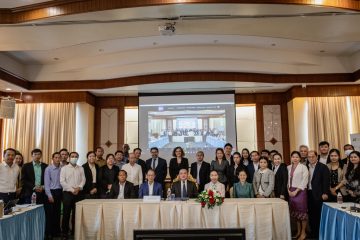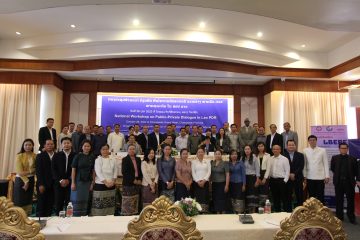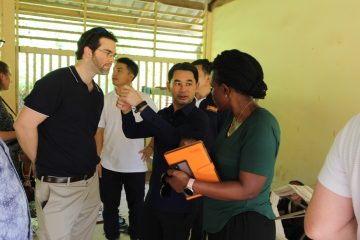Government, Business Community from central and southern part of the country discuss Medium Term Measures to Enhance Competitiveness of Non-resource sectors
Pakse, 29 March 2020. Government and private sector discussed findings of the full update of the Diagnostic Trade Integration Study and resulting Trade and Private Sector Development Roadmap on Mach 29.
The half-day meeting, which was organized by the Ministry of Industry and Commerce, drew more than 70 representatives from central government, provincial authorities, and private sector from 07 provinces of central and southern part of Laos.
During the meeting, Mr. Sengphanomchone Inthasane, Deputy Director-General (DDG) of the Planning and Cooperation Department, Ministry of Industry and Commerce (MOIC), who chaired the meeting, spoke about Lao government’s commitments to regional and international economic integration, concrete measures that both public and private sector need to take to take advantage of opportunities and cope with possible challenges associated with fulfilling growing international obligations, increasing competition, and the impact of the COVID-19 pandemic. “Given the production linkages across countries, international cooperation aimed at reducing trade costs and encouraging investment is essential. To this end, our country’s active engagement in the ASEAN Free Trade Area and the Regional Comprehensive Economic Partnership Agreement (RCEP), along with their multilateral commitments to the WTO, is vital for advancing investment and growth.”
Dr. Bounyadeth Thongsavanh, Director of the Department of Industry and Commerce (DOIC) of Champasak Province, stated the importance of trade and private sector development in national development policies. “It is widely recognized in our socio-economic development plans in both national level and provincial level that economic integration and private sector development are one of the key strategies to promote sustainable economic growth in our country. The private sector is being asked to play a crucial role in achieving the government’s overall economic growth, investment, employment, and poverty reduction targets set out in the 9th NSEDP and 2030 development strategy.”
The DTIS Update seeks to: (1) take stock of the progress in implementing the Trade and Private Sector Roadmap adopted in the DTIS 2012; (2) provide an in-depth focus on agribusiness, tourism, and manufacturing, and (3) prepare an updated Trade and Private Sector Roadmap.
While the study focuses on agribusiness, tourism, and manufacturing, it more broadly addresses the business enabling environment, trade costs, small-scale trade, and gender. The report identifies a priority list of measures that will support Lao PDR to realize more inclusive, diversified, and resilient growth.
Mr. Sengphanomchone Inthasane concluded the workshop by stating that as lead agency coordinating trade and private sector development agenda in Laos, MOIC will continue its interaction and deepen our dialogue with all stakeholders to ensure that all comments are reflected in the final published document and all future support programs address key issues affecting competitiveness of our non-resource sectors.
The Diagnostic Trade Integration Study Updated 2022 (DTISU 2022) is supported by the Enhanced Integrated Framework (EIF). EIF is an Aid for Trade partnership in action for the Least Developed Countries (LDCs). Operational since 2009, the EIF is a multi-donor program that supports the LDCs to become more active players in the global trading system by helping them tackle supply-side constraints to trade.


